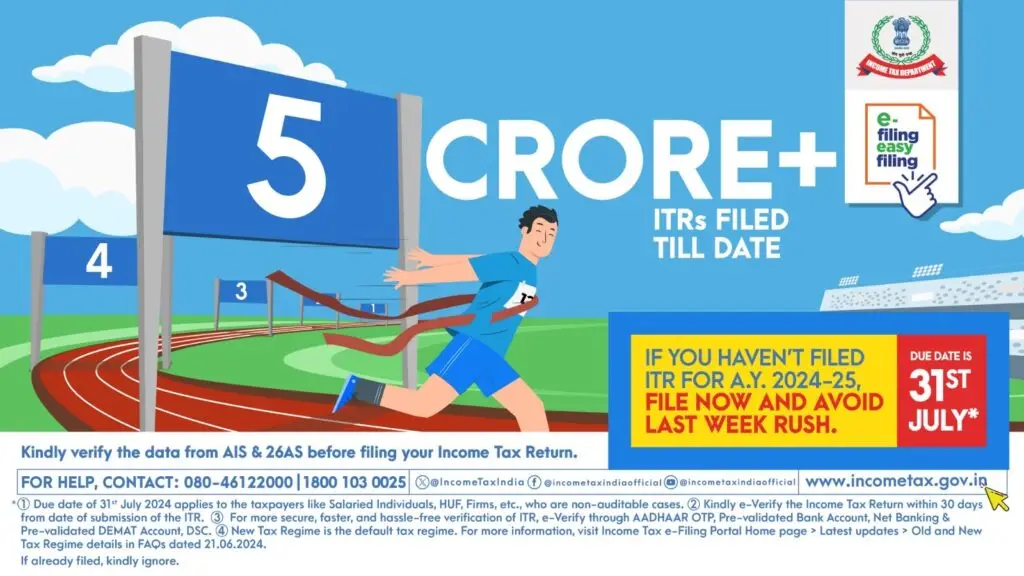Why Are Taxpayers Expecting an Extension for the ITR Filing Deadline FY 2023-24?
Filing income tax returns (ITR) is a crucial task that all taxpayers must complete annually. The deadline for the financial year (FY) 2023-24 is fast approaching, and taxpayers are buzzing with expectations of a possible extension beyond the current deadline of July 31, 2024. This article will delve into why many believe an extension might be on the horizon, the challenges faced in filing, and tips to ensure you meet the deadline.
Understanding the Importance of ITR Filing
Filing your ITR is more than just a legal obligation. It’s a vital part of ensuring that you contribute to the nation’s growth while also keeping your financial records in order. Timely filing helps avoid penalties, ensures smooth financial transactions, and can even assist in getting loans approved faster. But why are so many taxpayers expecting an extension this year?
The Current Deadline: July 31, 2024
The deadline to file your income tax return for FY 2023-24 is set for July 31, 2024. This date is crucial as it marks the final day to submit your returns without incurring any penalties or late fees. The income tax department has repeatedly urged taxpayers to complete their filings by this date to avoid complications.
Calls for an Extension
Advocacy by Tax Practitioners
One of the primary reasons behind the buzz for an extension is the formal request made by the All-India Federation of Tax Practitioners (AIFTP) to the Central Board of Direct Taxes (CBDT). They have asked to extend the deadline to August 31, citing various challenges that taxpayers and professionals are currently facing.
Technical Glitches and Access Issues
Tax practitioners have pointed out several technical glitches on the e-filing portal, which have made the filing process cumbersome. Issues such as difficulties in accessing Form 26AS/AIS/TIS and OTP verification failures have been common. These problems have led to repeated submission attempts, further complicating the process.
Government Stance on the Deadline
Statements from Authorities
Despite the technical issues, the government has maintained a firm stance on the deadline. Finance Minister Nirmala Sitharaman has emphasized the importance of timely filing, and improvements have been made to the e-filing portal to support up to 500,000 concurrent users.
Historical Precedents
Looking at historical data, the government has rarely extended the deadline in recent years, except under exceptional circumstances like the COVID-19 pandemic. This history suggests that while an extension cannot be completely ruled out, it remains unlikely under normal conditions.
Filing Statistics and Urgency
Over 5 Crore ITRs Filed by July 26
As of July 26, over 5 crore ITRs had already been filed, indicating a significant number of taxpayers are on track. The Income Tax Department has urged taxpayers to file their returns accurately to ensure timely refunds and avoid complications.
Ensuring Accurate Filing
Filing your returns accurately is essential to avoid delays in refund processing and potential penalties. Incorrect claims, under-reported income, and exaggerated deductions are common issues that can lead to notices from the tax department.
Challenges Faced by Taxpayers
Technical Difficulties
The e-filing portal, despite improvements, has not been without its issues. Taxpayers have reported difficulties in accessing necessary forms and facing repeated OTP verification failures, leading to a frustrating filing experience.
Document Verification Delays
Verifying the required documents in time can also be challenging. From obtaining the correct Form 16 from employers to ensuring all investment proofs are in place, these verifications take time and can delay the filing process.
Tips for a Smooth Filing Process
Gather All Necessary Documents Early
Ensure you have all the required documents, such as Form 16, interest certificates, investment proofs, and other relevant paperwork, well in advance. This preparation can save you from last-minute hassles.
Use Reliable Tax Software
Consider using reliable tax filing software that can help streamline the process. These platforms often come with customer support to assist with any issues you might face.
Double-Check Your Information
Before submitting your ITR, double-check all the information you have entered. Ensure that your income, deductions, and tax credits are correctly reported to avoid discrepancies.
Consequences of Missing the Deadline
Penalties and Late Fees
Missing the ITR filing deadline can lead to significant penalties and late fees. The penalty for late filing can go up to ₹10,000, and you might also face difficulties in carrying forward your losses.
Impact on Financial Transactions
Timely filing of your ITR is often required for major financial transactions, such as applying for loans or visas. A delay can lead to complications in these processes.
Conclusion
With the deadline to file your income tax return for FY 2023-24 just around the corner, it’s crucial to act swiftly. While the possibility of an extension remains uncertain, preparing early and filing on time can save you from penalties and ensure smooth financial operations. Gather your documents, use reliable software, and double-check your entries to make the process as seamless as possible.
Read More : Realme 13 Pro Series Launch: AI Innovations and Stylish Designs Redefine Mobile Technology
FAQs
1. What happens if I miss the ITR filing deadline?
If you miss the deadline, you may incur a penalty of up to ₹10,000 and face difficulties in carrying forward losses. It’s also crucial for maintaining a good financial record for transactions like loan applications.
2. Are there any exceptions to the ITR filing deadline?
Extensions are rare and usually only granted under exceptional circumstances. The government has maintained the July 31 deadline consistently in recent years.
3. What should I do if I face technical issues while filing?
If you encounter technical problems, try clearing your browser cache or using a different browser. You can also contact the customer support of the e-filing portal or use reliable tax filing software.
4. Can I revise my ITR after filing?
Yes, you can revise your ITR if you discover any errors after filing. The revised return must be filed before the end of the relevant assessment year.
5. How can I ensure my ITR is accurate?
Double-check all entries, ensure you have all necessary documents, and consider using tax filing software to minimize errors. Accurately report your income, deductions, and tax credits to avoid discrepancies.









